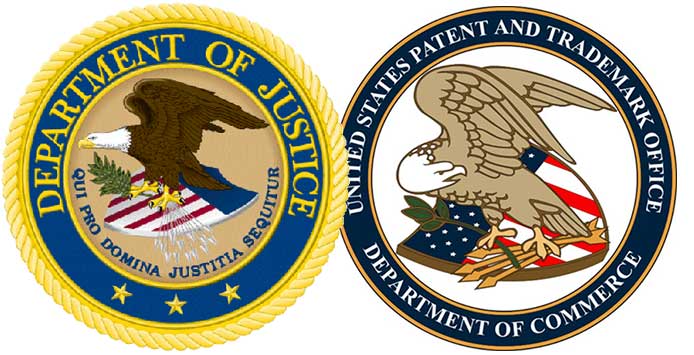The U.S. Department of Justice on Friday said it will close an investigation into Samsung's use of deemed standard essential patents as a weapon against other corporations, but promises to monitor the company's ongoing patent litigation.
While the Justice Department will not take action against Samsung at this time, it did admonish the company's use of declared essential patents as tools to more favorable licensing terms, reports Reuters.
In a statement released by the DOJ, the agency noted a number of issues arise when using SEPs to block competition from selling products. This brings up questions regarding anticompetitive strategies.
"While there are certain circumstances where an exclusion order as a remedy for infringement of such patents could be appropriate, in many cases there is a risk that the patent holder could use the threat of an exclusion order to obtain licensing terms that are more onerous than would be justified by the value of the technology itself, effectively exploiting the market power obtained through the standards-setting process."
The DOJ and U.S. Patent and Trademark Office said in January that companies owning SEPs should "rarely" use the properties in court.
Friday's announcement, and ensuing DOJ invetigation, stems from a successful Samsung patent infringement complaint leveled against Apple through the International Trade Commission. In that case, Samsung's U.S. Patent U.S. Patent No. 7,706,348 for UMTS wireless technology was leveraged to win an exclusion order against older iPhone and iPad models.
Apple was granted a reprieve from the injunction, however, as President Barack Obama vetoed the ITC decision in August 2013 over concerns that SEPs would be used to gain "undue leverage" over competitors.
Based on that decision, the DOJ said, "The Antitrust Division is therefore closing its investigation into Samsung's conduct, but will continue to monitor further developments in this area."
Samsung's use of SEPs in patent suits with Apple and other tech companies has raised concern in a number of regions over the strategy's legality. For example, the European Commission and South Korea's Fair Trade Commission initiated probes into Samsung's legal operations.
 Mikey Campbell
Mikey Campbell







-m.jpg)






 Malcolm Owen
Malcolm Owen
 Amber Neely
Amber Neely


 Christine McKee
Christine McKee

 Chip Loder
Chip Loder
 Marko Zivkovic
Marko Zivkovic









24 Comments
Perhaps the DOJ should assign a compliance monitor to Samsung. I hear that a guy named Bromwich is really good at that.
So since the President vetoed the decision which allowed Samsung to illegally use Stardards Patents as a weapon against Apple, Samsung is free to go.
[quote name="genovelle" url="/t/161949/doj-concludes-probe-of-samsung-essential-patent-use-will-continue-monitoring#post_2469144"]So since the President vetoed the decision which allowed Samsung to illegally use Stardards Patents as a weapon against Apple, Samsung is free to go.[/quote] Huh?
So since the President vetoed the decision which allowed Samsung to illegally use Stardards Patents as a weapon against Apple, Samsung is free to go.
It's not really that simple. Obama had nothing to do with 'allowing' anything so much as he vetoed the attempt to ban the products in question before a court decision was made. Because, he feels, injunctions shouldn't be allowed on SEP issues before the court comes to a ruling. Afterwards is a different game. There might be cause for an injunction (if say the 'offending' company refuses to properly license even when a fair offer is made).
The refusal to ban comes from the notion that the reasoning behind wanting the ban would be to stifle competition until such time as the item would very likely go off market anyway, be superseded by better tech and thus not wanted or at the least the other company was leagues ahead in the market because nothing else was offered.
So since the President vetoed the decision which allowed Samsung to illegally use Stardards Patents as a weapon against Apple, Samsung is free to go.
Not quite. If Obama didn't veto the ban, then Samsung could have gone ahead to enforce it. Since it never got that far, the DOJ didn't need to go any further. So Obama sort of prevented Samsung from doing anything anti-competitive by taking away their ability to seek a ban.
Samsung isn't off the hook, since the DOJ said it will continue to monitor Samsung in future patent cases. Which is interesting since 2 of the 4 patents in the March trial between Samsung and Apple are SEP's. Samsung never seems to learn.